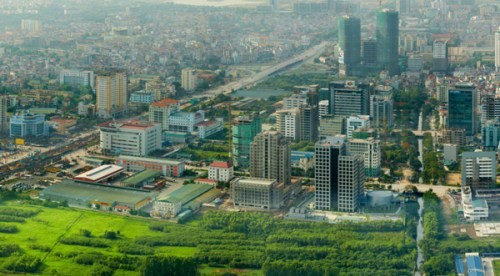 Vietnam plans to develop a low-carbon economy and include climate-change resistance work in its updated Nationally Determined Contribution (NDC) for the Paris climate accords. (Photo: kienviet.net)
Vietnam plans to develop a low-carbon economy and include climate-change resistance work in its updated Nationally Determined Contribution (NDC) for the Paris climate accords. (Photo: kienviet.net)Hanoi (VNA) - Vietnam plans todevelop a low-carbon economy and include climate-change resistance work in itsupdated Nationally Determined Contribution (NDC) for the Paris climate accords.
The information was released by Pham VanTan, deputy head of the Meteorology, Hydrology and Climate Change Departmentunder the Ministry of Natural Resources and Environment at a recent workshop inHanoi.
The workshop was organised by theenvironment ministry and the German International Co-operation Agency toconsult experts and policymakers before updating the NDC.
The move was taken under the requirementsof the 2015 Paris Climate Conference, Tan said.
Each party that ratified the Parisagreement was asked to submit an updated NDC every five years, defining theirefforts to contribute to holding the increase in the global average temperatureto well below 2 degrees Celsius, pursuing efforts to limit the increase to 1.5degrees Celsius and achieving net zero emissions by the second half of thiscentury, he said.
Speaking at the workshop, Professor TranThuc, a member of the Vietnam’s Panel on Climate Change said the update was tobe made after environmental changes in the international and domestic context.
In the world, the latest change was Chinashutting all coal-fire power plants in Beijing and cancelling the constructionof about 100 coal plants that were planned or under construction earlier thisyear, he said.
Additionally, developing renewable energysuch as wind and solar was becoming a global trend, with the prices of wind andsolar energy predicted to sharply fall by 2020, he said.
In Vietnam, per the national electricityroadmap to 2020, amended last March, the ratio of renewable energy is hoped toaccount for 6.5 percent of total national electricity output, he said.
Further, in late 2016, the NationalAssembly cancelled a project to build the Ninh Thuan nuclear power plant, hesaid.
"Renewable energy is expected to beone of major energy sources to replace nuclear power," he added.
Roadmap for NDC update
Tan said after the workshop, aninter-sectoral team, including officers from ministries and agencies, would beset up in July to compile detailed updates for the NDC. The team will collectinformation for the update in September.
After Vietnam participated in the 23rdsession of the Conference of the Parties (COP 23) in November, more informationshould be added to the updated version, he said.
The first draft of the updated NDC isexpected to be finished in March 2018. The near-final draft will be submittedto the Government’s consultation agencies in June 2019. After receivingcomments from agencies, the final draft will be finished and sent to theGovernment in August 2019. The official updated version of NDC will be sent tothe United Nations Framework Convention on Climate Change (UNFCCC) in September2019.
Martin Hoppe, First Counsellor of GermanEmbassy in Vietnam said the updated NDC would contribute to providinginformation for the dialogue in 2018 and global inventory under the UNFCCC in2023.
As Deputy Minister of Natural Resources andEnvironment Vo Tuan Nhan highlighted in his speech the need for support toprovide information and to conduct research for the updated NDC, "Germanyis happy to contribute" through ongoing projects in various areas fundedby its government, Martin added.
According to Nhan, the NDC is a nationaleffort and requires careful consideration by all major contributors andtransparency in implementation.
Stakeholders should understand what theircontributions are, what to prepare to and their responsibilities after the NDCis approved, he said.
Nhan also called for close cooperation andsupport from all ministries, agencies, development partners and other relatedstakeholders to this important process of reviewing and updating NDC.-VNA




























